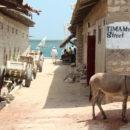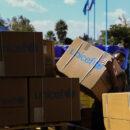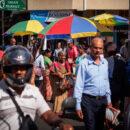Genocide: Where Law and Sociology Meet
Starting today, we open a debate on John Hagan and Wenona Rymond-Richmond’s Darfur and the Crime of Genocide. Over the coming days, a number of commentators will post reviews and discussions of the book, and the authors will respond. In this posting I open the debate.
John Hagan and Wenona Rymond-Richmond have written a book that is sure to spark many controversies. In this posting I want to take Darfur and the Crime of Genocide as the starting point for an exploration of the intersection of law and socio-political theory. Just as the word “˜genocide’ itself is a Greek-Latin hybrid, so too the concept is a legal-sociological fusion.
Let me open by citing two paragraphs from page 192 of their book, which for me present a particularly interesting argument:
Criminal law and social science operate with different goals and standards of evidence. Edwin Sutherland confronted this problem in debates about his then-controversial use of the concept of white-collar crime. Sutherland famously insisted that designations of white-collar crime did not require the legal evidence necessary to find a specific individual guilty “˜beyond a reasonable doubt.’ He instead argued that a civil law standard more consistence with social science and based on the “˜balance of probabilities’ should apply. Today, he likely would add that our interest as social scientists should be more in collectivities than in individuals. The “˜specific intent’ of greater importance for a criminology of genocide involves “˜collective racial intent.’ The kind of evidence presented in this chapter is highly relevant to a prima facie legal determination of genocide, but it is less relevant to the ultimate finding of the guilt or innocence of any specific accused individual.
Like the founding figure of genocide, Raphael Lemkin, Sutherland argued the importance of identifying white-collar crime as a crime, for the purposes of public discourse as well as scientific study. Yet, Sutherland also insisted that a social science of white-collar crime could not progress if it required the certainty of the criminal law. Social science is not bound, and cannot progress, with the same preoccupation about the guilt or innocence of specific individuals. Our attention focuses on more general social principles and processes, such as collective racial motivation and intent. More than fifty years after Edwin Sutherland added white-collar crime to the research agenda of criminology, it is time to do the same with Raphael Lemkin’s concept of genocide.
I argue that it is absolutely correct for any approach to genocide, whether social scientific, public policy or prosecutorial, to merge legal and the social scientific approaches. Any diplomatic or military measures to prevent or halt genocide require a socio-political analysis of the violence if they are to stand any chance of success. This is obvious. Less obvious is that any successful prosecution for genocide also requires a socio-political theory of genocide. Let me make several observations.
First, the parallel with white collar crime is illuminating. Investigating the sociology of genocide is an important exercise, even while dealing with standards of proof considerably below what is required to convict an individual. We should not allow the courts to be the sole arbiters of the crime.
In passing, I could add that human rights reporting is an interesting genre that reflects the hybrid nature of the genocide and crimes against humanity. The reports of organizations like Human Rights Watch are part socio-political journalism and part allegation of criminal responsibility. There is much reliance on victim testimony, and considerable inference from the pattern of crime and the behavior of belligerents. It is interesting to note that the presentational format and moral tenor of human rights NGO reports has influenced the approaches taken by international tribunals including the ICC.
Second, one of the book’s main insights, namely that genocide is a crime committed of a collectivity or an institution, is very important. An individual acting alone cannot commit genocide, only multiple homicide aggravated by racism or a similar motive. In standard criminal law, the distinction between motive and intent is fundamental: motive is irrelevant to a determination of guilt, and proving criminal intent is all that suffices. This distinction cannot be transferred to genocide with the same clarity. As Hagan and Rymond-Richmond note in the excerpted passage, the requirement of a specific intent for genocide is important. There must be a shared plan or project of some kind. Genocide cannot be committed solely as the byproduct of some other activity.
The case law developed by the ICTR and ICTY is not very useful in this regard as it has not grappled with the question of what kind of plan or project should be considered genocidal, and what kind of collectivity or institution can be said to possess such a plan or project. Can it only be a state? Could a security service or military unit, acting with the authority of a state, be genocidal? Can an insurgent organization (e.g. the Forces Democratique de Liberation du Rwanda) be legitimately described as genocidal? Could a corporation be genocidal””for example a logging company that destroys the entire habitat of a small native American hunter-gather group in the Amazon?
It is instructive that the favored prosecutorial strategies for genocide are variants of conspiracy and criminal enterprise, that is, membership in a collectivity or institution that is pursuing a genocidal plan or project. This lowers the bar on standards of proof for establishing the existence of a plan or project””it can be inferred from a systematic pattern of crimes.
The Prosecutor of the ICC, Luis Moreno Ocampo, has taken a very different approach in his Public Application for an arrest warrant against President Omar al Bashir. In the 14 July 2008 press conference in which he announced the application, Ocampo explicitly disavowed modes of liability including superior responsibility, conspiracy and joint criminal enterprise (JCE), in favor of the bold assertion that Bashir had indirectly perpetrated the crimes through others. This implies a different socio-political theory of genocide to that advanced by Hagan and Rymond-Richmond. It is the kind of charge that might have been laid against Adolf Hitler or Josef Stalin. Ocampo’s approach puts the focus back on the individual, who is allegedly guilty of designing and implementing a genocidal plan. This doesn’t obviate the need for a sociology of genocide, it just implies a different one.
Third, there are important contrasts between genocide and white collar crime. Genocide is graver. But also, the order of conceptual manufacture is different. With white-collar crime, sociological inquiry and definition came first, driving legal definition (which is still controversial and imprecise). Concepts of conspiracy were elaborated and specific concepts such as JCE created. With genocide, a legal-sociological concept was coined first, including its own implied social theory and jurisprudence. This is now being developed both through the courts and through social science, but it betrays its origins of sixty years ago in Europe. Within the Genocide Convention’s implicit sociology there are two overlapping and competing paradigms of genocide. One is eliminationist mass murder according to a state plan and a racist ideology. The other is imperial conquest and subjugation of conquered peoples. The 1994 Rwandan genocide fitted into the first paradigm fairly easily. Because of the untimely death of Slobodan Milosevic, we have been denied a true test of where former Yugoslavia may have fallen.
Neither of these implied theories apply to Darfur without a stretch. Hagan and Rymond-Richmond, focusing on the atrocities committed during the height of hostilities in Darfur in 2003-04, make a case in support of genocide. I would argue that the fact that the grave crimes were confined to the localities and the time period of that intense conflict is an argument against specific genocidal intent, and rather that crimes against humanity were committed in the course of counterinsurgency. The International Commission of Inquiry into Darfur headed by Antonio Cassese draws a comparable conclusion, noting that crimes against humanity are no less serious or heinous than genocide.
Prosecutor Ocampo makes another, less sophisticated case, and claims ongoing genocide across all of Darfur. He has surely stretched the much abused concept of genocide beyond its breaking point.







In this book, I see the repeat of a dangerous path that the US has fallen already fallen foul to when it believes its narrative and policy template for another country is the only accurate game in town: it’s called WMD Avenue, zip code, Baghdad, Iraq. This book is the latest round in disingenuous US accusations of “genocide†in Darfur – which nobody here on the ground in Darfur and the rest of Sudan subscribes to: not Sudanese, Western diplomats , international aid agencies, the African Union or the UN. Nobody. Just because the US says it is – genocide – doesn’t mean that it is so; again the road called WMD Avenue, Baghdad is instructive. The US should heed the danger when it ignores the consensus of the UN (which long determined that the “big g†wasn’t happening in Darfur) and takes a unilateral view of events in a far away country.
In fact, even ex-Secretary of State, Colin Powell, declared it wasn’t genocide when he came to investigate the situation on the ground here in Darfur, only to shamelessly change his mind on the grounds of political expediency in front of the rabidly anti-Sudan Senate Foreign Relations Committee. What a terrible, unforgivable slur on the Sudanese nation and the Sudanese people. Concurrently, books like these are nothing more than the continuation of the same hideous propaganda campaign by US government and civil society; the Save Darfur Coalition has already established and distributed bogus “educational packs†for school children across the US that treats the declaration of genocide as a fact and imploring them to do something about it rather than the bare-faced lie that it clearly is. That’s disgusting – brainwashing a new generation of Sudan haters, as will this latest tomb of ‘research’ and ‘analysis – and is on a par with the brainwashing against the US and Israel that American academics, politicians, and the media (rightly) bleat on about in the madrassas (Koranic schools) in the Palestinian Occupied Territories, Saudi Arabia, and Iran.
Thank God for Sudan – the latest in-vogue country for woefully uniformed US academic research now that Iraq has become old hat – as John Hagan, Wenona Rymond-Richmond and countless other US and Western academics would evidently be sitting twiddling their thumbs doing nothing. Take note: Sudan is not a testing ground for intellectual indulgence by Mr Hagan and Ms Rymond-Richmond or anybody else for that matter. No country deserves to exist under such a harsh and unrelenting spotlight. Full stop. Let Sudanese chart their own course, and let’s end such shallow commentary and intellectual indulgence as is evident in this latest book by Dr Hagan and Dr Rymond-Richmond.
Ibrahim Adam – El Fasher, North Darfur.
Th only part of Ibrahim Adam’s comment that I agree on is the extent to which excessive commentary and intellectual indulgence the so called Sudan experts have immersed themselves in. Everywhere in DC there are panel discussions about Sudan or other war-torn countries. These people have not learnt from Rwanda or other tragedies in Africa. I agree that us is important to get the policy right, but time is especially crucial. These debates and panel discussions only buys time for murderous regimes like Bashir’s to continue his heinous crimes. We helpless Africans can only hope that our tragedies are met with urgency like other non-African countries. I already doubt that Obama will make any difference. He is aready positioning himself as domestic-issue-driven leader and relegating foreign policy to the same people who have been in previous governments and were toothless. What hopes do we have of a different policy towards Africa from the Obama administration?
“No country deserves to exist under such a harsh and unrelenting spotlight.” –Ibrahim Adam
I cannot disagree with Mr. Adam more. EVERY country deserves to be (and should be) held up to such a harsh and unrelenting spotlight. No country is perfect, and every country should be held responsible for their behavior. Especially when people are dying within their borders, or they are responsible for the deaths of people in other countries.
On a completely different note:
Mr. De Waal provides an interesting assessment of Hagan and Richmond-Rymond’s argument. He raises important points about issues of human rights and the grave nature of genocide. De Waal also acknowledges that genocide is a collective crime. It cannot be committed by an individual. Despite this acknowledgement, De Waal returns to a focus on individual responsibility (i.e. a legal/prosecutorial focus). It seems like one of the important points that Hagan and Rymond-Richmond make is that genocide is a collective event, and we struggle to identify it and define it because we are looking for individuals to hold responsible for a collective act.
Maybe I am missing something, but stating that genocide happens in one of two ways, trying to identify one of the ways (often after the fact), and then identifying the individuals responsible doesn’t seem to be a very effective way of theorizing, prosecuting, or preventing genocide from occurring.
cloraquine https://chloroquineorigin.com/# hydroxchloriquine